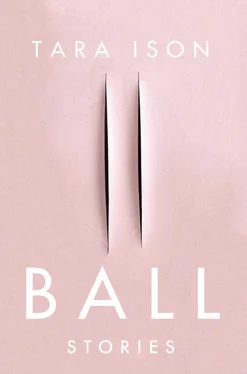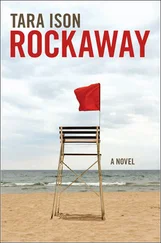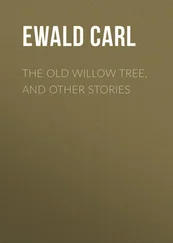Tara Ison - Ball - Stories
Здесь есть возможность читать онлайн «Tara Ison - Ball - Stories» весь текст электронной книги совершенно бесплатно (целиком полную версию без сокращений). В некоторых случаях можно слушать аудио, скачать через торрент в формате fb2 и присутствует краткое содержание. Год выпуска: 2015, Издательство: Soft Skull Press, Жанр: Современная проза, на английском языке. Описание произведения, (предисловие) а так же отзывы посетителей доступны на портале библиотеки ЛибКат.
- Название:Ball: Stories
- Автор:
- Издательство:Soft Skull Press
- Жанр:
- Год:2015
- ISBN:нет данных
- Рейтинг книги:3 / 5. Голосов: 1
-
Избранное:Добавить в избранное
- Отзывы:
-
Ваша оценка:
- 60
- 1
- 2
- 3
- 4
- 5
Ball: Stories: краткое содержание, описание и аннотация
Предлагаем к чтению аннотацию, описание, краткое содержание или предисловие (зависит от того, что написал сам автор книги «Ball: Stories»). Если вы не нашли необходимую информацию о книге — напишите в комментариях, мы постараемся отыскать её.
Rockaway
A Child Out of Alcatraz
Reeling through Life
Ball With a keen insight into the edges of human behavior and an assured literary hand,
is the new book by one of the West’s most provocative stylists.
Ball: Stories — читать онлайн бесплатно полную книгу (весь текст) целиком
Ниже представлен текст книги, разбитый по страницам. Система сохранения места последней прочитанной страницы, позволяет с удобством читать онлайн бесплатно книгу «Ball: Stories», без необходимости каждый раз заново искать на чём Вы остановились. Поставьте закладку, и сможете в любой момент перейти на страницу, на которой закончили чтение.
Интервал:
Закладка:
He comes home late, just as she expected, because she understands now that he will always come home late. But he will always come home.
She offers the glass to him with a shaky hand.
Is this what you want? she asks. Will this finally do it?
He takes the glass from her, looks at it; in the fading light its contents glow a thick, sanguine red. She feels her very marrow has begun, at last, not to regenerate but to seethe. Too late. She’s shaking, she’s limp and drained.
Will this be my life now? she asks. Will it?
Yes, he says, looking her dead in the eye. He raises the glass.
I’m sorry, he says, and drinks.
FISH
She is in town to dispose of her uncle, but she can’t do that until he dies. It is Any Time Now. She is eyeing the creeping analog clock hands on any wall, the digital display outside every savings and loan. She is tapping her foot, drumming fingers, chomping at the bit. And, she is organized: The local Neptune Society phone number is entered in her always-charged phone; the power of attorney document is in her datebook and the DNR form is on file, for if and when there’s any ugly hospital debate over invasive procedures or more tubes; she has gone to his dingy studio apartment, in a seniors’ complex smelling of Pine-Sol and fish bones and flakes of skin, selected his final clothes, and has them in a plastic grocery bag in the trunk of her rental car. Jeans and once-white cotton Henley, the kind she remembers him wearing when she was a child, gone now to a stale ivory. She figured that was the best choice, natural, biodegradable fibers. The Neptune Society had not offered explicit instructions on this, but she imagined polyester or rayon or viscose wouldn’t burn well. She had a terror of getting a call that a bad melt of synthetic fibers had ruined the crematory slab or emitted a toxic gas. She was concerned she’d get billed for it. That there would be a protracted legal dispute, all of it angry and ultimately pointless. She wonders why the body needs to be dressed at all — let’s just unhook the monitors and IV, strip the gown away, wheel it off to the oven. She pictures her uncle’s doughy naked body splayed on a big, wooden pizza paddle, a burly Neapolitan man giving it a quick jerk of a shove into flames. Afterward, the Neptune Society will throw the cremains in a body of water for her, if she wishes — the Mississippi, she assumes — or hand them over to dispose of herself. They’re sensitive to the family’s preference. She doesn’t want them. What would she do with them? Does anyone in real life keep ashes on the mantel, in an urn? She’s not buying an urn. She wishes the river, by all means. Let the ashes float like a tap of fish food, let the bone fragments and Levi’s rivets sink down to the silt. She will have him ready to go. That’s her job. She has already boxed up his meager belongings, has glanced at then thrown away the album’d and carefully framed family photos he’d kept all these years — everyone in outdated clothing and hairstyles, posing together with camera-false smiles — and donated the rest to Goodwill. She’d hesitated over the long-unused fishing rod and tackle, the hat with its dangling hooks, wondering if they might fetch a good eBay price, then tossed all of that in, too, not wanting anything prolonged. She’s already written deceased on a copy of his lease and sent it to the complex manager; it’s premature, but he certainly won’t be going back there. Which she’s glad of, it’s a blessing, no more need to imagine him banished to a lonely beige box of a room, watching an endless loop of cop-and-game-show TV, eating salmon from an individual serving can and munching on saltines from the pack. She’ll write deceased on his final round of bills, on any junk mail, on the stub she’ll send back from his final Social Security check. Which ought to cover the cost of the Neptune Society. She estimates, thanks to her organization, that roughly one more total hour of her time, no more, will be spent on all of this once he’s dead. She imagines herself getting a stopwatch, going click with it at the final rattle of his final breath, saying Go! , and timing it down to the second. She is not the true, technical next of kin — there is still her mother, the uncle’s blood sister, and her two own older siblings — she is merely the one who assumes this kind of job, the one everyone assumes will do it. And she is the one her uncle had chosen; it is her name, in what she assumes was a moment of perverse nostalgia, or punishment, or trust, that he had written on forms. No, no one will question her account of events this time, or get in the way. The family’s wishes are all hers to wish. She is happy to fulfill this obligation, to be the one in charge of closure. She is pawing at the ground, chewing her nails, twisting her hair. If she smoked, she’d be constantly lighting up, one eye squinting at the clock through a nostriled plume.
For now, she is sitting in chain restaurants with photos of food on their laminated menus, reading used pulp mysteries bought for twenty-five cents off a cart in the hospital lobby. She is sucking relentlessly on small hard candies she keeps in her pockets, leaving their crumpled cellophanes behind wherever she goes. She is going to matinees, for the discount admission and chunk of time it kills. She is checking her office voicemail, e-mailing updates with brief declarative sentences to her parents. She is seeing the sights: the Arch, the plane that Lindbergh flew, the world-famous Botanical Garden. She goes to a riverboat casino that calls Twain to mind, methodically inserts twenty dollars’ worth of quarters in a slot machine, and leaves without winning or losing another cent. She is eating frozen custard, which people here seem to eat a lot of, even as the weather is turning chill. People in the Midwest in general seem very large to her. She wonders how the local Neptune Society deals with this. If all that fat makes it harder to do their job. Her uncle has gotten fatter, too, in the dozen plus years since she saw him last, waving good-bye to her from his car, his fishing hat askew, although he seems shrunken at the same time; she remembers him as jolly-fat, energetic, always proposing to the child her some fun game they could play together, some special adventure they could go off on, just the two of them, alone. She hopes the guy with the pizza slide won’t have a problem getting him to burn. She knows no one in St. Louis except, of course, her uncle and, now, the doctors and nurses. She goes to the hospital for fifteen minutes in the morning and fifteen minutes in the evening to check on How He’s Doing. It is Any Time Now, they tell her. It is A Waiting Game. She is called upon to do nothing; there are tubes going in and tubes going out, the pillows and sheets are arranged, and the meds, now, keeping pain managed, organs running hydrated and calm. She sits in a chair in the corner of his room, listens to his shallow breathing, to the beeps and faint hospital-speak PA announcements, and reads until the next quarter hour. Sometimes she brings chocolates or little hard candies to the doctors and nurses. They’re sure he knows she’s there, they tell her, despite his incomprehensive gaze and his incomprehensible mumbles. She’s relieved he is incapable of actual speech. The nurses tell her he is lucky to have such a wonderful niece. They asked, when she first arrived, if there were other family members they should contact.
No, she told them. We have no other family. It’s just the two of us.
She makes very sure, each time she leaves, that they have her cell number.
SHE LIKES THEBotanical Garden. There’s an Orchid House, and a section devoted to mutant roses, and a lily pond with enormous flat fronds the pamphlet tells her native women used to let their babies sleep upon while they pounded clothes clean. There’s a Shakespeare Garden, with multiple references to Ophelia. There’s a Japanese section, with bonsai and small beds of pebbled sand raked into rows to evoke Zen. She takes deep breaths as she strolls here; this place should bring peace of mind, without asking, like flight attendants bring the beverage service at twenty minutes in. A diminutive river flows along, a clear green swath. There are a dozen varieties of koi, here at the Missouri Botanical Garden , the pamphlet tells her. She’d like to see them and their dozen varieties, but there is always a throng of tourists clogging the red wooden footbridge, usually couples and families with small children, and they’re always very loudly engaged by the fish, laughing and pointing as they throw food. The children jump up and down. It’s now her third trip to the Botanical Garden, and she’s increasingly annoyed by this agitation. The Japanese section would be very peaceful, if it weren’t for all the squealing and fish-pointing. The camera-clacking. She can’t remember her family ever taking little sight- or fish-seeing excursions like this. Perhaps when she was very small. She tries to recall. All those smiley photos her uncle had taken and kept, yes, the outings as a family group. But she more readily pictures the moments left unshot, unsnapped. Her sister’s attention-demanding tantrums in shopping malls and amusement parks that provoked their parents to hurried exits, without anyone getting the promised roller-coaster ride or the art supplies needed for school. She thinks of her brother’s inevitable asthma attacks and inconsistent food allergies, the relentless parental attention to air quality and the ingredients of his meals, the usual vomiting of popcorn or jelly bellies or carrot sticks wherever they went. She remembers cleaning up his colorful vomit. All the turmoil and fuss. This time, she decides, she will claim the bridge for herself. She wants to feed the fish, too. It is her right, after paying her Botanical Garden admission fee. Feeding the fish, quietly, will bring the peace, will be the Zen thing to do.
Читать дальшеИнтервал:
Закладка:
Похожие книги на «Ball: Stories»
Представляем Вашему вниманию похожие книги на «Ball: Stories» списком для выбора. Мы отобрали схожую по названию и смыслу литературу в надежде предоставить читателям больше вариантов отыскать новые, интересные, ещё непрочитанные произведения.
Обсуждение, отзывы о книге «Ball: Stories» и просто собственные мнения читателей. Оставьте ваши комментарии, напишите, что Вы думаете о произведении, его смысле или главных героях. Укажите что конкретно понравилось, а что нет, и почему Вы так считаете.












